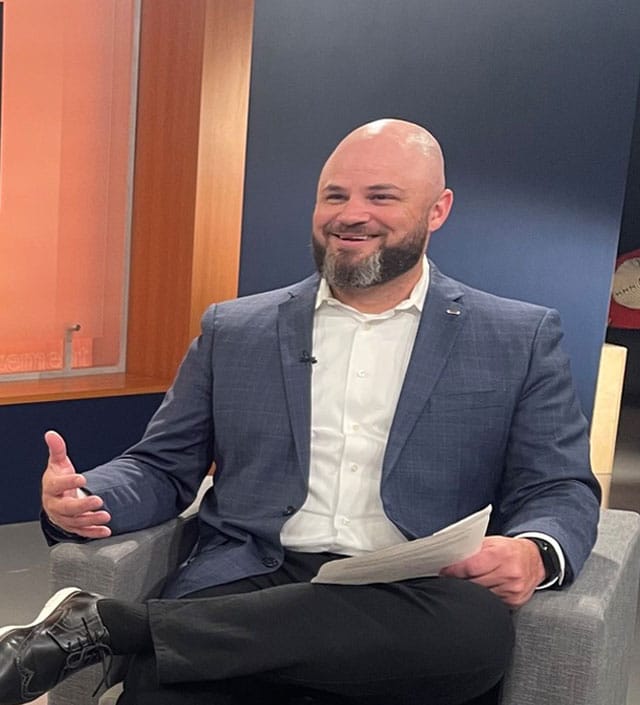Editor’s note: Rethinking65 recently had the opportunity to meet Chet Bennetts, CFP, assistant professor of financial planning and program director of the ChFC and CFP certification programs at The American College of Financial Services. Bennetts, 43, is also an adjunct lecturer at the University of Nebraska-Lincoln. During a follow-up conversation, we continued to discuss his military experience (he served in the Iraq War), why he sold his Nebraska-based practice, and his efforts to improve financial security and retirement readiness for veterans and all Americans.
Jerilyn Klein: Chet, you’ve had an interesting career journey — from years as a staff sergeant in the U.S. Marines, to running your own financial planning practice, and now teaching and directing the ChFC and CFP certification programs at The American College. How did your time in the military help set the foundation for your career in service?
Bennetts: I was a pre-9/11 service member. I joined the military in ’98, as an opportunity to serve and for the college benefit. Back then, that service-above-self mindset and trying to be part of a team and working towards a common goal was really the foundation of a lot of it. When transitioning to financial planning, there’s a lot of commonality in the skillsets that you learn in the military, certainly in the Marine Corps. Then when you throw on top of it combat experience and working in teams like that, it lends itself very well to being able to overcome adversity, overcome rejections.
Also, the best designed plan in a combat environment is great, but it’s going to have to shift gears because the environment is constantly changing. You can have the best financial or retirement plan in the world but as soon as the laws change or products change, you have to be nimble enough to be able to move left or right or center and still accomplish the goal or mission.
Klein: Did you know before you left the military that you were interested in working in financial services and as an advisor? What led you there?
Yeah, I did. The latter part of my Marine Corps career was in reserve capacity. After I got my undergrad degree in 2002, I started working in financial services in a call center, helping people with 401(k) questions. I got all my licenses and then worked my way up working with plan administrators. Then, I deployed in 2004 as a reservist. I was in Fallujah in November of 2004 [during the Battle of Fallujah] — lots of rockets, lots of mortars, all kinds of things that go boom. I ended up getting hurt, though I was one of the lucky ones, and then medically discharged. When I got back [home], I knew I still wanted to be involved in financial services.
Klein: Was there something specific that made you want to shift to working one-on-one in the advisor capacity?
Bennetts: As much as I got beat up and dinged up in Iraq, I was still very functional. But after being home a month, I got in a really bad motorcycle accident. I was in a coma for about a week and it took me about six months to walk again. During my recovery, I was at home watching “The Price is Right” and seeing all the commercials on disability and motorcycle accidents and all of these things.
I was working for a financial services company with great benefits, but no one had ever talked to me about supplemental disability insurance. No one they’ve ever told me, “Oh hey, that 60% disability benefit that you get is still taxable.” So here I was, back from war, laying on a couch and the after-tax equivalency of a group benefit in my case was 38%. And we started going into credit-card debt [He and his wife had three kids by the time they were 22].
I remember thinking, “Why was no one brave enough to talk to me about this? I feel like this is something that everyone should know.” That’s what really propelled me towards client-facing, individual financial planning.
Although this wasn’t a direct career motivator, I also saw what happened in the Marines with a guy we lost who didn’t have his beneficiaries set up correctly. He was in a convenience marriage, which a lot of young servicemen engage in to get out of the barracks and get more money. His SGLI [Servicemembers Group Life Insurance] and death benefit went to this random person in North Carolina instead of his parents and sibling.
Klein: When we met at a recent American College event, you said your clients included farmers, as well as military families. You also said that some of your best client meetings took place on tractors. Do you remember what you discussed with a particular client on a tractor? And how can advisors best meet their clients, even if it’s across a desk, to make sure they understand their needs and goals?
Harvest season is toward the end of the year, which means the tax year is closing. When I reminded one farmer that we needed to discuss some estate-planning issues, he apologized that he was going to be spending a lot of time on a tractor. Finally, I said, “I’ll meet you at the end of the field. I’ll jump in with you.”
The family was going to be transitioning its very large, very successful, high-valued operation between brothers and in-laws. This involved getting the right mechanisms in place, both from a legal standpoint and also funding buy-sell agreements either through existing assets or bringing on other products, like life insurance. The father was starting to have health problems and his two sons (I rode the tractor with one of them that day) were trying to figure out what to do.
In general, you have to meet the clients where they are, whether that’s physically in a location or where they are along their journey of financial planning.
Klein: You served as a personal financial counselor for the Nebraska National Guard and have also testified before Congress on behalf of veterans. What issues have you advocated for?
Bennetts: In 2016, Congress passed a law [10 U.S.C. 992] that requires the Department of Defense to provide financial counseling services to military service members and their families. And it is great. The vast majority of people who enlist are young, not college educated, very diverse. Often, joining the military is a huge jump in socioeconomic status. Now, all of a sudden, they have a consistent paycheck, they have money in their pocket and they don’t know what to do — and they’re preyed upon. The financial counselors in the program have to be a CFP, a CHFC or an AFC – it’s written into the law — and the service members get free, non-biased, non-sales-related financial counseling and planning services.
But once you’re 180 days removed from your active contract, that goes away; you don’t have access to the program anymore. My advocacy lies in that that we should be allowing the access for veterans. Research has shown that financial empowerment reduces suicidal ideation, it reduces risk-taking behavior, and it reduces domestic violence in the military and veteran populations. If it’s good enough for our service members and families, it should be something we’re including for veterans.
Klein: What are the biggest financial and other issues that you see facing veterans today?
Bennetts: It’s all over the board. [With finances], I think the veteran community is probably not that dissimilar from their non-veteran civilian counterparts: It’s debt management and being smart on allocating this scarce resource, money. Another issue is not knowing the resources available to veterans. Many veterans, including those suffering from PTSD, don’t think they’ve earned the right to ask for the same benefits from the VA [U.S. Department of Veterans Affairs and Veterans Health Administration] as their friends who got hurt worse.
I think the more we can destigmatize among my generation of veterans that it’s ok to ask for the benefits they have fought for and earned — even if that that doesn’t mean the government will write them a check today — the better off they’ll be.
For example, a veteran going to the VA to get hearing aids at 80 will have harder time trying to file a claim 60 years removed from service. The longer you wait to try and establish a service connection, it’s easy for the VA say, “Oh, wait a second, but you’ve been a truck driver for the last 40 years, as a civilian. It might be that you’re hearing loss is from that and not from you firing artillery shells or cannons.” But if you get your hearing checked soon after serving, even if the VA denies you compensation now, at least it’s on file that you have some military-related hearing loss. So, when you need hearing aids many years later, you don’t have to establish that your hearing loss was service-related.
Klein: What should all advisors be aware of to better serve veterans who are retiring from the military or are retiring from a post-military career?
Bennetts: It’s another layer of complexity, on top of Social Security and Medicare. But understanding how a client and possibly their spouse can utilize the long-term-care facilities of the VA and other benefits makes our job easier. If we know a veteran has another layer that we can put into their plan, that frees up resources to accomplish their other goals.
Here’s an analogy that just popped into my head: Say I’m trying to complete a 1,000-piece puzzle and the box has the picture on it. If I tear off a third of the box and then try to do the puzzle, it’s going to be very difficult. Advisors lacking awareness of the veteran piece don’t have a full picture of how to put together the puzzle [for a client].
Klein: That’s a good analogy! So, which document do veterans need to be able to access their military-related retirement benefits?
Bennetts: DD 214. Every veteran, regardless of how close they are to retirement, should have it [in hand] because it’s proof that they served for X amount of time and were discharged honorably — or whatever the discharge code is. The DD214 is the gateway to benefits and resources both at the federal level, through the VA, and at the state level. State Departments of Veterans Affairs oftentimes also have benefits that people aren’t aware of, even if it’s just a free hunting or fishing license, or free state-park access, whether you’re 25 or 85.
Klein: What are the parallels you see between leading a Marine squad or platoon and running a financial advisory practice? How did you make sure everyone was on the same page and motivated, in both settings?
Bennetts: Like I said, you still have to accomplish the mission or accomplish the goal, although the path may look different or the destination is not negotiable. There is also a sense of resiliency. Early on in my career, the stakes of going door-to-door [through cold calling] were a lot lower than going door-to-door in Fallujah. If the worst-case scenario [as an advisor] is that someone’s going to tell me “no,” that’s not that bad of a day. That kind of mindset of “it could always be worse” really propelled me through some of the inherent barriers of being a young, brand-new advisor, where the statistics and retention aren’t great.
Klein: That’s the important client piece. But what about running a practice?
Bennetts: I’d say the biggest thing that translates very well is, you are not and should not be the expert about every single thing. There is a reason why there are specialties in the military. [Similarly,] if you’re not really good at Medicare, you can’t try to fake it out of fear of what a client may or may not think of you. You’d have to bring in someone [a Medicare expert] and we have to check our egos at the door so that we can help clients the best we can.
Additional Reading: New Study Underscores Importance of Retirement Advice
One of the best advisors I ever had when I was in management at a larger firm was dyslexic. The advisor had to have the CFP exam read to them but was hands down one of the most successful advisors because they realized very early on that their value was in the relationship. They would have to bring in someone like me or another product expert, and they set that expectation for the client that they were the quarterback.
In my experience, a lot of advisors view having to bring in someone else as a negative when really, it should be something that they’re doing. But in the military, I’m not going to be the expert at demolitions if I’m not a demolitions person. If I’m not a medic, I’m not going to try to be one; I’m going to bring the medic over if we need a medic.
Klein: What did you focus on in your practice?
Bennetts: Initially it was like any other advisor: Anything that moved. But I quickly realized that I could work better in organizations. I worked with some non-qualified deferred comp and group plans on the retirement side, and helped structure buy-sell arrangements on the business side. I worked with business owners in the small- and medium-size business markets.
Klein: You mentioned when we first spoke that your decision to sell your financial practice in 2020 and get involved in academia was a way to further expand your mindset of “service above self.” Can you tell me more about this decision and what it required to again shift gears?
Bennetts: November of 2018, 14 years removed from Iraq, when we had lost more guys from my unit to suicide than we did in Iraq, that’s when I started questioning what is going on and what could be done. I started asking the VA and the academic community about this idea of integrating financial counseling, financial planning. I just like to call it financial empowerment. As an established financial professional, I wondered, “Why are we not providing financial counseling and financial-planning services as part of PTSD treatment in the VA?” This propelled me to work towards my PhD, and I had money left for school on my GI Bill benefits.
I though, “If we included financial empowerment techniques into the existing PTSD treatment methodologies, would we see it an increase in the effectiveness of the existing PTSD treatment?” No one was really talking about it, no one was really researching it. There were some things here and there, but it wasn’t really direct. I just felt, “Someone needs to do this, might as well be me.”
I wasn’t initially planning on selling my practice. I was going to work on my PhD [in personal financial planning] and do both. But I quickly realized that avenue of being able to contribute to educating consumers and educating advisors who educate consumers, and doing research and doing advocacy, was really more in line with where I wanted to go. I joke because lots of people in their midlife crisis buy a Corvette; I decided to get a PhD. That might’ve been cheaper and a lot more fun!
Klein: You mentioned that you’re doing research to inform public policy that can create better outcomes for consumers. What specifically are you working on?
Bennetts: It’s long been known in the medical community, how interconnected things are within biological, psychological and sociological elements. In the ‘70s, the biopsychosocial model of health was introduced. I don’t want to get in the weeds on that. Most of my research and my dissertation, which I’m finishing, is specifically about the biopsychosocial model as it applies to pre-retirees and retirees, using [longitudinal] data available through the University of Michigan’s Health and Retirement Survey.
My research really is proposing a new model that is this intersection of physical health, mental health, financial resources, and how there may be directionality that we can show when you when you have increases of financial empowerment through either education or planning. I’m also looking at the long-term impact this may have at a physical and psychological level, and the policy implications. Can we replicate financial confidence in a different way by empowering people to know how to use the resources they have, and might that have similar impacts in the psychological and physiological domains?
So, it’s a longer-term thing. I’m trying to play chess, not Whac-a-Mole, with some of these things. I think they’re important elements as “pracademics,” as we call ourselves — practitioners who have turned academic. I think we can help at least guide conversations in these multidisciplinary and very complicated domains because humans are complicated creatures. Last year, I was awarded a legislative fellowship through the VFW [Veterans of Foreign Wars] and Student Veterans of America., which enabled me to share ideas with policymakers.
Klein: Any final thoughts?
Bennetts: We know that financial stress is generally the No. 1 or No. 2 source of stress in people’s lives, and that as a society we don’t deal with stress very well. We eat too much, drink too much, smoke too much, and spend too much to compensate for stress. It’s affecting us physically, psychologically. Not that this [research] is going to cure cancer. But if we are able to manage stress as a society better or have an outlet. I would hope that it helps in some of those things.
Jerilyn Klein is editorial director of Rethinking65. This article has been edited for brevity and clarity.







